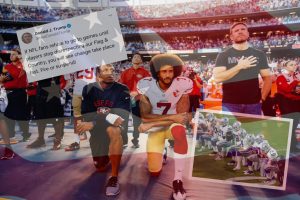Kneed to Decide
Instead of kneeling during the national anthem, NFL players should find ways to bring real change.
November 7, 2017
As the national anthem echoes through football stadiums around the country, the sport that has spent years bringing the nation together, now divides. Many players have chosen to engage in a political protest against racism by kneeling during the anthem. In turn, they have started a firestorm of controversy.
It started with one man. San Francisco 49er Colin Kaepernick sat during the national anthem at the first two preseason games of last season. He said he did so “to stand with the people that are being oppressed,” particularly in response to police brutality toward people of color. To make his statement more noticeable, he then began taking a knee during the anthem. Before long, at sporting events around the country, athletes sporadically joined in by kneeling or raising a fist. But, as the season rolled on, media attention faded.
Fast forward a year, and there is a new resurgence in the protest bringing it back to the forefront of the media stage. Add to that, President Donald Trump’s pronouncement that anyone who kneels during the anthem should be fired or suspended, and now, with every change of the channel, photos of protests flood the screen. Each opinion is seen as a bold statement. Standers are called unsympathetic, kneelers are called ungrateful to those who have fought to preserve the country and its freedoms.
The flag is the greatest symbol of America, and many have given their lives to protect it. It represents freedom and hope, the beauty of the American people and the greatest country in the world. Just because football players have the Constitutional right to kneel for the anthem doesn’t make it the right thing to do. Though the actions of the protesting players do cause national conversation, kneeling during the anthem is not well received by much of the public and has yet to bring about any positive change.
For many, professional football players represent the American values of hard work and determination and the successful pursuit of the American dream. These football players also represent the National Football League, an organization that has made millions portraying themselves as an All-American institution. Many fans don’t appreciate players using the NFL sidelines for their protest platform. As a matter of fact, a recent Seton Hall Sports poll found 52 percent watching fewer games and half of those point to anthem protests as the cause. If football players feel there are injustices in the country, there are better forums and positive ways to raise awareness and promote change.
Instead of creating rifts throughout the nation, football players could use their influence in ways that work toward unity. Whether that be peaceful protest events such as marches or speaking out alongside the victims of injustice or raising money to better at-risk communities, players are more likely to bring real change in ways that don’t alienate a good portion of America. Many NFL players already have foundations that raise money to clothe, feed, educate, provide athletic opportunity and otherwise care for their communities in positive ways. By focusing their efforts on active, everyday change, they influence the nation from the ground up.
The Dallas Cowboys made a team decision to kneel together prior to the anthem. In doing this, they validated and recognized the importance of the racial injustice issue in a unified manner. They also showed the importance of respecting the flag and the overwhelmingly positive aspects of the United States of America. It was a win-win action.
Racial injustice is a serious, complex issue. It’s going to take a united stand against it to stop it. Protests such as kneeling during the national anthem only divide and alienate and are counterproductive. If NFL players, or anyone else for that matter, really want to influence the nation, they should do something that unites and lays out action steps to real change. Just because you have the right to take a knee doesn’t mean you should.





